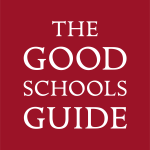Back in the late 19th century, the Proms were held at the Queen’s Hall, a beautiful art nouveau rotunda on Upper Regent’s Street. It was subsequently flattened during the Blitz. All the concerts were conducted by Sir Henry Wood, whose bust now presides over the series at the Royal Albert Hall. The BBC stepped in to save the Proms when they nearly went bust in 1927, and they have never looked back. The mission was simple and remains the same: to provide top-quality music for everybody, in egalitarian surroundings, at affordable prices.
This wonderful and quintessentially British institution swept into Hampden Hall on Friday 7 February, the day after the anniversary of Queen Elizabeth’s Accession to the Throne. And it was the most incredible of evenings: the Emanuel School Choir, the Emanuel Parents’ Choir, alumni of the school, the choir from Sacred Heart Roman Catholic School, four stellar soloists (Philippa Boyle, Kate Symonds-Joy, Greg Tassell and James Oldfield) and a 40-piece professional orchestra combined to produce the most magisterial and resplendent sound.
James Oldfield, Bass-Baritone
The evening opened with Ralph Vaughan-William’s rousing arrangement of the Old 100th psalm, first performed at the coronation of Queen Elizabeth II in 1953. This was followed by the major work in the evening’s concert, Elgar’s Coronation Ode. It was written in 1902 for the coronation of King Edward VII. The King suggested to Elgar that words could be provided to the Trio section of the first Pomp and Circumstance March, which he liked: Elgar took up the King’s suggestion and asked Benson to provide words so that the tune could form the climax of the Ode. Not everyone was so keen, though….one close friend of Elgar said of the final movement “you will have to find another tune for the Ode… I have been trying to fit words to it. That drop to the note E and the bigger drop afterwards are quite impossible in singing any words to them, they sound downright vulgar. Just try it. The effect is fatal and it will sound horrible”. Elgar ignored his advice and, in the end, the work was an immense success, bringing Elgar a status unprecedented for a British composer at that time and leading to honours from several British and American universities and, in 1904, a knighthood. The joints choirs were on scintillating form: throughout the varied and demanding movements, tone quality was ripe and resonant, diction was clear, rhythms pungent, and attacks and cut-offs precise.
In the second half, there was very much a celebratory atmosphere. Everyone in the hall joined in with Holst’s ‘I vow to thee, my country’, Parry’s ‘Jerusalem’ (with Elgar’s unsurpassed orchestration), ‘Land of Hope and Glory’ (as part of Elgar’s Pomp and Circumstance March No. 1) and, somewhat amusingly, in the festivities of Henry Wood’s ‘Fantasia on British Sea Songs’, where humming, whistling, singing and party hooters all played a part. The evening ended with Hubert Parry’s setting of Milton’s ode, ‘At a solemn Musick’. The piece’s rich harmonies and regal brass fanfares made for an irresistible experience of Milton’s ‘divine sounds’ and ‘high-raised phantasy’.
Congratulations to all involved in this spectacular concert.
Mr Janz (Director of Music)
From the EPA
After another crescendo of weekend rehearsals and a joyous fanfare of Proms pieces at the concert last weekend, the Parent Choir’s post-concert doldrums are even greater than usual as it was sadly the last in which Mr Gregory will be involved as a member of the Emanuel Music department. On behalf of the Parent Choir, we would like not only to wish him well in his well-earned retirement, but also to thank him for giving up his Saturdays for 15 years (as if his weekly schedule wasn’t busy enough) so that the parents can be a part of this incredible musical event! His ability to play absolutely anything you present him with, at double speed when required, and on almost any instrument was astounding. Both his musical genius and his humour will be sorely missed. Thank you Mr Gregory.
The Parent Choir in the Emanuel concert hall, with Simon Gregory at the piano













